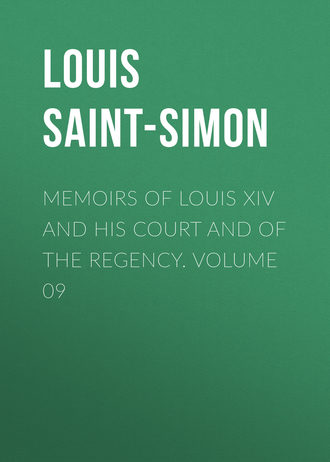 полная версия
полная версияMemoirs of Louis XIV and His Court and of the Regency. Volume 09
Immediately afterwards, the Cardinal was announced, and the intendant and maitre d'hotel were forced to make off with their papers and their table. As soon as he was alone with Bonzi, he explained why he had requested this visit, and both laughed heartily. Since then his business people have never caught him again, never during the rest of his life would he hear speak of them.
He must have had honest people about him; for every day his table was magnificent, and filled at Paris and at the Court with the best company. His equipages were so, also; he had numberless domestics, many gentlemen, chaplains, and secretaries. He gave freely to the poor, and to his brother the Marechal and his children (who were not well off), and yet died without owing a crown to a living soul.
His death, for which he had been long prepared, was fine-edifying and very Christian-like. He was universally regretted. A joke of his with the King is still remembered. One day, at dinner, where he always paid much attention to the Cardinal, the King complained of the inconvenience he felt in no longer having teeth.
"Teeth, sire!" replied the Cardinal; "why, who has any teeth?"
The joke is that the Cardinal, though old, still had very white and very beautiful teeth, and that his mouth, large, but agreeable, was so shaped that it showed them plainly in speaking. Therefore the King burst out laughing at this reply, and all present also, including the Cardinal, who was not in the slightest degree embarrassed. I might go on forever telling about him, but enough, perhaps, has been already said.
The commencement of the new year, 1715, was marked by the death of Fenelon, at Cambrai, where he had lived in disgrace so many years. I have already said something about him, so that I have now but little to add. His life at Cambrai was remarkable for the assiduity with which he attended to the spiritual and temporal wants of his flock. He was indefatigable in the discharge of his functions, and in endeavouring to gain all hearts. Cambrai is a place much frequented; through which many people pass. During the war the number of wounded soldiers he had received into his house or attended to in the hospitals passes all belief. He spared nothing for them, neither physical comforts nor spiritual consolations. Thus it is incredible to what an extent he became the idol of the whole army. His manners, to high and low, were most affable, yet everywhere he was the prelate, the gentleman, the author of "Telemachus." He ruled his diocese with a gentle hand, in no way meddled with the Jansenists; he left all untouched. Take him for all in all, he had a bright genius and was a great man. His admiration true or feigned for Madame Guyon remained to the last, yet always without suspicion of impropriety. He had so exactly arranged his affairs that he died without money, and yet without owing a sou to anybody.
ETEXT EDITOR'S BOOKMARKS:
Admit our ignorance, and not to give fictions and inventions
Arranged his affairs that he died without money
For penance: "we must make our servants fast"
The argument of interest is the best of all with monks











